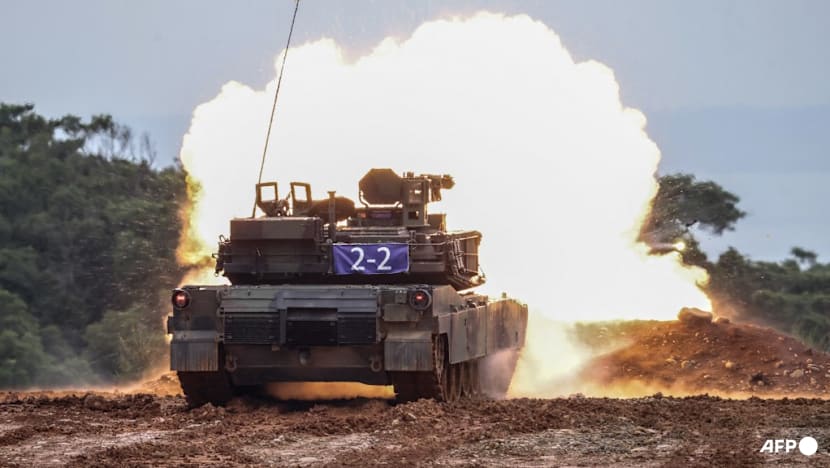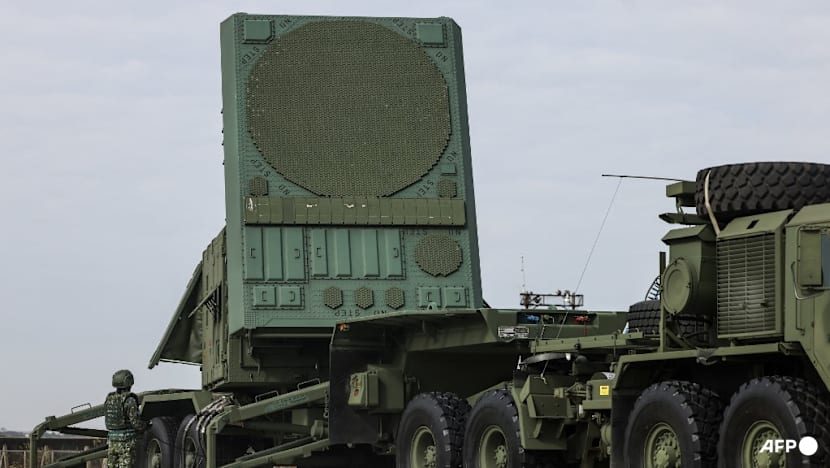Taiwan defence ministry to seek up to US$33 billion to harden security, lawmaker says

The Taiwanese army holds a live-fire shooting session for Taiwan's first batch of the advanced US-made M1A2T Abrams tanks, which takes place separately from the annual Han Kuang military exercise, in Hsinchu on Jul 10, 2025. (Photo: AFP/I-Hwa Cheng)
TAIPEI: Taiwan's defence ministry plans to seek up to a record US$33 billion in special funding to upgrade the island's defences against a potential Chinese attack, a senior lawmaker told AFP.
As Beijing ramps up military pressure on the democratic island, Taiwan in recent years has responded by boosting its defence spending.
But Washington, Taipei's biggest arms supplier, has been pushing it to do more.
The ministry is working on a special budget of between NT$800 billion and NT$1 trillion (US$26 billion and US$33 billion) over seven years, said Wang Ting-yu, who belongs to President Lai Ching-te's Democratic Progressive Party.
The final amount has not been finalised as Taiwan negotiates with the United States over potential arms sales that would be included in the special budget, Wang told AFP in an interview this week.
"We want to build a complete defence ecology to defend our country," said Wang, describing the plans as a "huge" upgrade to the island's self-defence capabilities.
Wang said the plans included integrating Taiwan's air defence systems; acquiring from overseas partners more advanced technology to detect small drones, rockets and missiles and ensure a rapid response to an attack; and increasing the island's capacity to produce and store ammunition for wartime.
Taiwan lives under constant threat of invasion by China, which claims the self-ruled island is part of its territory and has threatened to seize it by force.
"China is developing their fifth-generation fighters and they're using stealth technology in all kinds of drones or missiles," said Wang, who sits on the parliamentary Foreign Affairs and National Defence Committee.
"So we need more advanced sensor systems, more advanced radar systems - if you cannot detect it, all kinds of fire units are useless."

Wang's remarks came as Taiwan seeks to strike a deal with the United States to reduce President Donald Trump's 20 per cent tariff on the island's shipments.
Taipei has been eager to show Trump it is serious about shoring up the island's defences, which would be no match for China's firepower in a conflict.
Last month, Lai's government announced plans to boost its 2026 defence budget to NT$949.5 billion, or more than three per cent of gross domestic product.
It aims to increase spending to five per cent of GDP by 2030.
Asked if he hoped the special defence budget plans would help Taiwan in the trade negotiations, Wang replied: "Yes".
Taiwan's defence ministry declined to comment when contacted by AFP.
If the Cabinet approves the spending plan, it will have to be passed by the opposition-controlled parliament before it can take effect.
"ENEMY THREAT"
The China-friendly Kuomintang (KMT) has the most seats in parliament and has been able to stymie Lai's policy agenda with the help of the smaller Taiwan People's Party (TPP).
The KMT and TPP previously joined forces to cut the government's 2025 budget and freeze some defence spending.
But Wang said he hoped the opposition parties would support the special budget proposal because it was for "our survival".
KMT lawmaker Huang Jen, co-chair of the Foreign Affairs and National Defence Committee, said if the budget were submitted to parliament, the party's caucus would "definitely discuss it before making a decision".
"We understand the enemy threat, and pressure from the US, but given limited resources, the key is how to spend money effectively," Huang told AFP.
Su Tzu-yun, a military expert at Taipei's Institute for National Defense and Security Research, said Taiwan urgently needed to strengthen its air defences.
"Beyond the threat of drones, China currently patrols the waters around Taiwan with about eight warships, each carrying roughly 60 vertical launch system cells," Su told AFP.
"These vessels could launch 500-plus cruise missiles, conduct surprise attacks and reach Taiwan's critical military facilities in approximately three minutes, creating a new missile crisis."

















